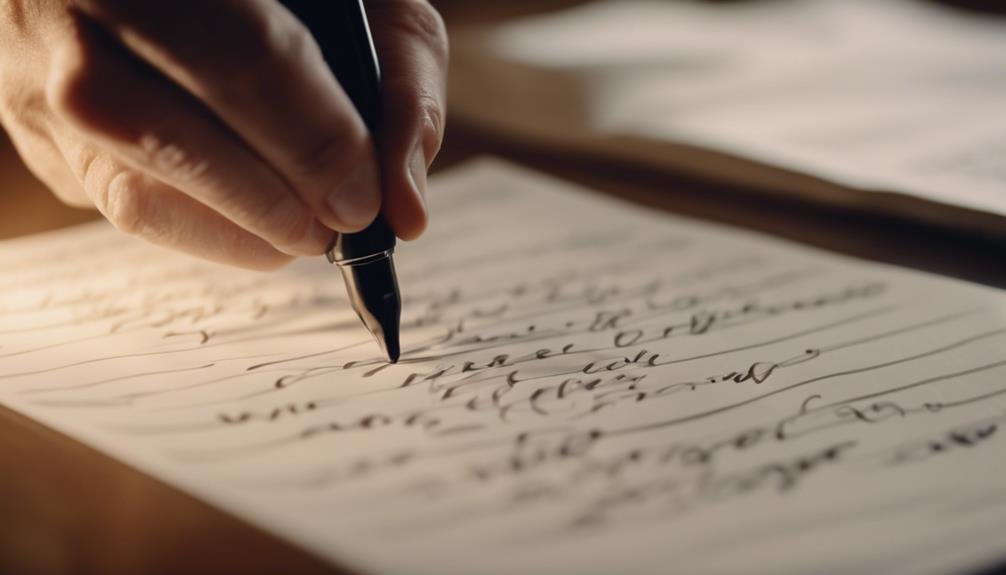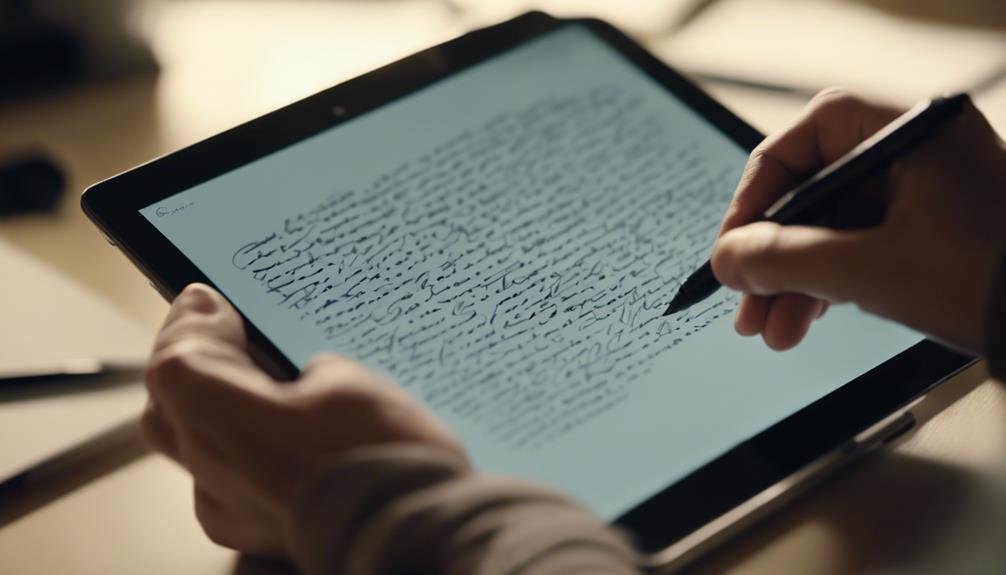"Cherishing Little Steps - A Haven for Baby and Family Journeys"
The Importance of Handwriting Skills in the Digital Age
You might argue that in a world dominated by keyboards and touchscreens, the need for handwriting skills is diminishing. However, consider this: the act of physically putting pen to paper offers unique benefits that go beyond mere communication.
From enhancing cognitive functions to improving fine motor skills, the importance of handwriting in the digital age cannot be understated. As you navigate through the complexities of modern technology, a deeper look into the significance of handwriting skills might just reveal a world of advantages waiting to be explored.
Key Takeaways
- Handwriting enhances memory retention and cognitive function, surpassing digital methods.
- Personal expression and emotional processing are enriched through the unique tactile experience of handwriting.
- Handwriting fosters creativity, individuality, and authenticity in communication, standing out in the digital era.
- Mastering handwriting skills promotes physical dexterity, professionalism, and sets individuals apart in a digital world.
Cognitive Benefits of Handwriting

When it comes to improving memory and enhancing cognitive function, handwriting has been shown to offer unique advantages over typing on a keyboard. Handwriting analysis, a field that explores the personality traits revealed through one's handwriting, can provide valuable insights into a person's psyche. By examining the size, slant, spacing, and pressure of the writing, experts in handwriting analysis can uncover subconscious thoughts and emotions, aiding in self-discovery and personal growth.
Moreover, handwriting therapy is a specialized technique that utilizes the physical act of writing to promote mental well-being. Engaging in handwriting exercises, such as journaling or copying affirmations, can help reduce stress, improve focus, and boost overall cognitive function. The intentional and mindful nature of handwriting therapy allows individuals to slow down, connect with their thoughts on a deeper level, and ultimately enhance their cognitive abilities.
Memory Retention and Handwriting
Exploring the connection between handwriting and memory retention reveals intriguing insights into how the physical act of writing can enhance your ability to recall information effectively. When you write things down by hand, you engage multiple senses, such as touch and sight, which can help improve focus and enhance learning. The act of forming letters on paper creates a stronger memory trace in your brain compared to typing on a keyboard. This process of encoding information through handwriting stimulates areas of the brain related to memory and cognitive functions, making it easier for you to remember what you've written.
Research suggests that students who take notes by hand tend to retain information better than those who type their notes. This is because handwriting requires more intricate motor skills, leading to increased engagement with the material. So, the next time you're studying or attending a lecture, consider picking up a pen and paper to boost your memory retention and deepen your understanding of the subject matter.
Creativity and Personal Expression

To release your creativity and express yourself uniquely, consider the power of handwriting in the digital age. Handwriting allows you to set free your personality into your creations, making them truly personalized art pieces. Here's how embracing handwriting can enhance your creativity and personal expression:
- Individual Style: Handwriting is like a fingerprint; it's unique to you. Your handwriting style reflects your personality and emotions, adding a personal touch to your work.
- Set Free Creativity: The fluidity of handwriting can inspire creativity in ways that typing cannot. The tactile experience of putting pen to paper can spark new ideas and enhance your artistic expression.
- Emotional Connection: Handwriting has a raw, authentic quality that can evoke emotions and create a deeper connection with your audience. Your handwritten notes or artwork convey a sense of intimacy that digital text often lacks.
Handwriting Vs. Typing in Learning
Consider the impact of handwriting versus typing on learning outcomes. When comparing academic performance, studies have shown that handwriting can lead to better retention and comprehension of information compared to typing. The act of physically writing notes by hand engages different cognitive processes than typing on a keyboard, which can enhance learning and understanding.
In addition, learning styles play a vital role in determining whether handwriting or digital skills are more beneficial for individuals. Some learners may find that the tactile experience of handwriting helps them process and remember information more effectively, while others might prefer the efficiency and organization that typing offers.
It is essential to recognize that both handwriting and typing have their strengths and weaknesses when it comes to learning. By understanding your own learning preferences and experimenting with different methods, you can discover which approach works best for you in improving academic performance and mastering new skills.
Handwriting and Emotional Processing

Handwriting can greatly impact how individuals process and regulate their emotions. The act of physically forming letters on paper can have a profound effect on your emotional well-being. Here's how:
- Handwriting and Therapy, Emotional Regulation: Engaging in handwriting as part of therapy can help you express and process emotions more effectively. Writing by hand allows for a deeper connection to your thoughts and feelings, aiding in emotional regulation and self-reflection.
- Handwriting and Communication, Social Skills: Writing by hand can also improve your communication and social skills. Whether it's jotting down a heartfelt letter or taking notes during a conversation, handwriting can enhance your ability to connect with others on a more personal level.
- Handwriting and Mindfulness, Stress Reduction: The rhythmic motion of handwriting can promote mindfulness and reduce stress. Taking the time to write things out by hand encourages you to slow down, focus on the present moment, and alleviate feelings of anxiety or overwhelm.
Incorporating handwriting into your daily routine can be a simple yet powerful tool for enhancing emotional processing and well-being.
Handwriting for Brain Development
Exploring the connection between handwriting and brain development reveals intriguing insights into cognitive growth and neural pathways. Handwriting plays a critical role in fostering brain development, particularly in the areas of literacy and academic achievement. When you engage in handwriting activities, you stimulate various parts of your brain responsible for language processing, memory retention, and fine motor skills. Research indicates that the act of physically forming letters by hand enhances neural activity in a way that typing on a keyboard does not, leading to improved retention and comprehension.
Handwriting is closely linked to literacy development as it helps in the recognition of letters, shapes, and words. This process strengthens neural pathways associated with reading and writing, ultimately boosting overall academic achievement. By practicing handwriting, you aren't only refining your motor skills but also enhancing your cognitive abilities. So, next time you pick up a pen, remember that you aren't just writing words – you're actively shaping your brain for better learning outcomes.
Handwriting and Fine Motor Skills

Developing strong handwriting skills is essential for enhancing fine motor abilities, which are vital for various daily tasks and academic success. Fine motor skills involve the coordination of small muscles in movements, particularly in the hands and fingers.
Here's how handwriting contributes to improving these abilities:
- Enhanced Sensory Integration: Writing by hand engages multiple senses such as touch and sight, aiding in the development of sensory integration skills.
- Improved Motor Coordination: The intricate movements required for handwriting help in refining motor coordination, which is vital for tasks like buttoning a shirt or tying shoelaces.
- Fine Muscle Control: Handwriting exercises the small muscles in the hand and fingers, promoting dexterity and precision in movements.
Mastering handwriting not only boosts fine motor skills but also supports overall physical and cognitive development. So, keep practicing those pen strokes to strengthen your hands and enhance your motor skills!
Handwriting in the Workplace
In today's professional environment, the ability to communicate clearly and effectively through handwritten notes remains a valuable skill that can set you apart from your peers. Enhancing your communication skills and maintaining good penmanship practice can leave a lasting impression on colleagues and clients alike. Additionally, handwritten notes add a personal touch that digital communication often lacks, showcasing your attention to detail and professionalism.
| Benefits of Handwriting in the Workplace | Details |
|---|---|
| Communication skills | Enhances personal connection |
| Penmanship practice | Shows attention to detail |
| Document authenticity | Adds a personal touch |
| Signature verification | Ensures security and trust |
| Professionalism | Sets you apart from peers |
Mastering handwriting not only aids in conveying messages effectively but also plays an important role in document authenticity and signature verification, which are essential in various professional settings. Embrace the art of handwriting to elevate your workplace communication and leave a lasting impact on those around you.
Handwriting in a Digital World

Handwriting in a Digital World
Amidst the digital landscape of modern society, handwriting continues to hold significance as a unique form of communication that stands out in a sea of emails and texts. Despite the prevalence of digital devices, the art of handwriting remains relevant for various reasons:
- Penmanship Challenges: In a world where typing on keyboards has become the norm, maintaining good penmanship skills poses a challenge for many. However, the effort put into honing these skills can set you apart and add a personal touch to your messages.
- Digital Penpals: While emails and instant messages dominate online communication, having a digital penpal with whom you exchange handwritten letters can bring a sense of nostalgia and intimacy to your interactions.
- Personalization: Handwritten notes, whether scanned and sent electronically or on paper, add a personal touch that digital messages often lack. They show care and thoughtfulness that can deepen connections in this fast-paced digital world.
Preserving Handwriting Traditions
To uphold the legacy of handwritten communication, you can actively engage in practicing and promoting traditional penmanship techniques. Handwriting practice is not just a skill but a form of art that connects us to our history and culture. By preserving handwriting traditions, you contribute to the beauty and uniqueness of handwritten communication in today's digital age.
Here is a table highlighting ways to preserve handwriting traditions:
| Ways to Preserve Handwriting Traditions | Description |
|---|---|
| Attend calligraphy workshops | Learn and perfect intricate penmanship techniques. |
| Start a handwritten letter campaign | Encourage others to embrace the beauty of handwritten notes. |
| Create a pen pal network | Connect with others through handwritten letters for meaningful interactions. |
Frequently Asked Questions
How Can Handwriting Skills Impact a Person's Overall Well-Being and Mental Health?
Improving your handwriting skills can have a positive impact on your overall well-being and mental health. Through emotional expression and stress relief, it can enhance memory retention and cognitive function, leading to a healthier mind and body.
Are There Specific Handwriting Techniques or Styles That Are More Beneficial for Cognitive Development?
When it comes to cognitive benefits, specific penmanship techniques like cursive writing can enhance brain development. By engaging different parts of the brain, such styles promote memory retention, focus, and overall cognitive skills.
Can Handwriting Help Improve Attention and Focus in Individuals With ADHD or Other Attention Disorders?
Sharpen your focus and attention with handwriting techniques tailored for cognitive development and attention disorders like ADHD. Engaging in handwriting can enhance concentration and boost your brain's ability to stay on task.
How Does Handwriting Play a Role in Developing Problem-Solving Skills in Children and Adults?
When you engage in handwriting, you strengthen problem-solving strategies by connecting ideas creatively. This process boosts critical thinking and analytical skills, enhancing your ability to tackle challenges with a mix of logic and innovation.
Are There Any Studies That Show a Correlation Between Handwriting Abilities and Academic Success in Students?
Penmanship studies have shown a positive link between handwriting abilities and academic performance. Improving your handwriting can boost your grades and overall success in school. Practice your writing skills regularly to excel academically.
Conclusion
To summarize, in today's digital age, handwriting skills are more important than ever. They offer cognitive benefits, enhance memory retention, foster creativity, and improve fine motor skills.
Like a handwritten note, your ability to write by hand is a unique and personal touch that sets you apart in a world dominated by technology.
So, keep practicing your handwriting skills to preserve this tradition and reap the many benefits it has to offer.


